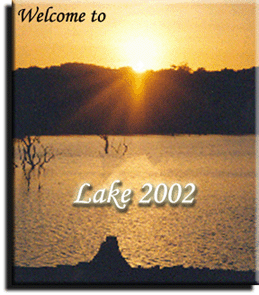
PROGRAM |
||
| HOME | PROGRAM |
|
 |
Venue Satish Dhawan Auditorium
(CSIC Auditorium) Indian Institute of Science (IISc) Campus, Bangalore |
December 9 - 13, 2002
 Organised by
Organised by 
| HOME | PROGRAM |
|
INTRODUCTION |
Lake 2002 is a five day symposium organized to bring out the current trends in aquatic ecosystem conservation, restoration and management including the hydrological and the biophysical aspects, peoples participation and the role of non-governmental, educational and the governmental organisations and future research needs for the restoration, conservation and management. This also provides a forum for researchers, technologists, economists, sociologists and others to meet and discuss water related issues. Lake 2002 will:
• introduce the major types of aquatic ecosystem and the type and diversity of organisms characteristic of and important to each other;
• describe the main physical and biological processes important in several major types of aquatic ecosystems, and their consequences for community structure and function; and
• outline some problems of management and conservation in aquatic ecosystems.
AQUATIC ECOSYSTEMS perform numerous valuable environmental functions. They recycle nutrients, purify water, recharge ground water, augment and maintain stream flow, and provide habitat for a wide variety of flora and fauna and recreation for people. A rapid population increase accompanied by unplanned developmental works has led to the pollution of surface waters due to residential, agricultural, commercial and industrial wastes / effluents and decline in the number of waterbodies. Increased demands for drainage of wetlands have been accommodated by channelisation, resulting in further loss of stream habitat, which has led to aquatic organisms becoming extinct or imperiled in increasing numbers and to the impairment of many beneficial uses of water, including drinking, swimming and fishing. Various anthropogenic activities have altered the physical, chemical and biological processes within aquatic ecosystems. An integrated and accelerated effort toward environmental restoration and preservation is needed to stop further degradation of these fragile ecosystems. Failure to restore these ecosystems will result in sharply increased environmental costs later, in the extinction of species or ecosystem types, and in permanent ecological damage.
Conservation, Restoration and Management is viewed in watershed context. Abatement of eutrophication, siltation and contaminant problems are more effective when inputs are controlled. Reduction of inputs enhances the long-term effectiveness of in-lake approaches. The watershed is the natural scale for restoration and would be self sustaining. Effective restoration can be achieved through collaboration among scientists, economists, managers, policy makers and local people. The proposed Lake 2002 symposium on conservation, restoration and management of aquatic ecosystems will enable planners, scientists, administrators and NGO's concerned with watershed development in the region to discuss the various aspects involved in the management of wetlands. This will enable better understanding of the hydrology, water and land resource development programmes and monitoring of their performance for sustainable development.
We thank the students and staff of the Energy and Wetlands Research Group, Centre for Ecological Sciences for their wholehearted support and involvement in organizing the symposium.